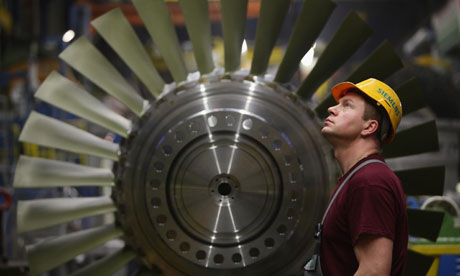Germany's economic success over the past decade is largely due to exporting more than it imports. Who will it sell to now?

Greece's economic crisis is a gift from heaven for the German government. The country is the ideal conservative dystopia of an irresponsible government financing a supposedly overblown welfare state by ever increasing debt, where workers enter retirement in their mid-50s, the dead continue receiving pension payments and public employees earn bonuses for arriving punctually at work. Never mind that, exceptions aside, public expenditure as a proportion of GDP is lower in Greece than Germany and the average Greek works longer hours and retires only half a year earlier than the average German. That did not stop those stories from being widely reported by the German media. It strengthened the moral tale of the hard-working Germans being abused by lazy southerners. The tale is convenient because it diverts attention from Germany's responsibility for the eurozone's current economic woes.
The tale goes like this: while Greeks wasted their time on the beach drinking Ouzo, Germans implemented painful economic reforms. Indeed, in the 2000s Germany deregulated its labour markets, reduced real wages to increase competitiveness, shrunk the public sector, cut pension entitlements and implemented a debt break into the constitution. After almost a decade of dismal economic growth and heavy belt-tightening, Germany has negotiated the 2008 global economic crisis successfullyalmost without employment losses, has since grown strongly and now registers the lowest unemployment rate since 1991. If southerners would have just followed the German model, the whole crisis could have been avoided.
Actually, Germany's good performance in the 2008 global economic crisis and after is hardly due to belt-tightening but to the adoption of a large fiscal expansion package in the crisis and generous government subsidies for companies to safeguard employment. That such a pragmatic strategy could also help today's eurozone crisis countries has not even been considered by the government. Having supposedly had good experiences with austerity itself, Germans believe the same bitter medicine could lead even lazy Greeks to economic success – if only wholeheartedly applied.
But can it? Last week the Greek parliament passed its fifth austerity package in just two years. Greek austerity is especially harsh. Although Greece is in its fourth year of a severe recession with real output down by 12% since 2007, the fiscal deficit as a proportion of GDP has been reduced by seven percentage points, a historically almost-unique achievement. But those policies were self-defeating. The debt-to-GDP ratio has exploded, government bond yields have stayed sky-high and both measures of business and consumer confidence are in freefall. The unemployment rate now stands at 21%. Young people are especially hard hit: unemployment among those aged younger than 25, already high before the crisis, stood at 40% in 2011. Consequently, company bankruptcies, suicide rates and crime have risen.
Heavily influenced by the German finance ministry, the solution of the troika (the EU Commission, the IMF and the ECB) to austerity's failure is even more austerity. Together with the EU Commission and the ECB, German finance minister Wolfgang Schäuble still strongly believes in the confidence-creating power of fiscal austerity, although they have been proved wrong. Those beliefs underlay all of the troika's growth forecasts upon which the goals for deficit reduction were based. Since there was no upswing in confidence, growth fell precipitously and the government systematically missed the agreed goals.
All this was predictable – and actually predicted. In a 2003 study that analysed 133 IMF austerity programmes, the IMF's independent evaluation office found exactly the same scheme of self-defeating austerity caused by the underestimation of its disastrous effects on economic growth.
Unimpressed by those facts, German policy-makers have begun blaming Greek ineptitude for the failure to consolidate the budget. This is why they have proposed a budget viceroy for Greece and an extra account for Greek tax incomes dedicated to service the public debt, far away from the government's reach. Because Germans believe their belt-tightening in the 2000s was such a success, its failure in other countries has to be due to those governments' moral flaws.
However, both the tale of the successful German reforms and their prescription to the rest of the eurozone are based on a fallacy: the fallacy that every country can export more than it imports. A closer look at Germany's economic experience for most of its eurozone membership reveals that only trade surpluses were keeping Germany from economic collapse. Half of Germany's dismal economic growth of just 1.7% on average between 1999 and 2007 – the second lowest in the eurozone – was driven by trade surpluses. Those are, by definition, the deficits of someone else.
Far from being a growth engine, the reforms of the 2000s depressed German internal demand and thus imports, much the same as they do in Greece nowadays. They also depressed German loan demand and squeezed bank profits. At the time, the southern economies were the perfect solution for Germany's self-inflicted economic problems. German banks could expand their business by lending them the money to purchase the goods that Germans could no longer afford themselves. Manufacturers and banks were happy. Germany's beggar-thy-neighbour policies only worked because others pursued the exact opposite policies.
This is why the eurozone-wide adoption of austerity cannot work. Greek demand for German goods is small, but Spanish, Italian, French, Portuguese and Irish imports amounts to a large share of German exports. Germany's flawed policies for the eurozone are bound to backfire. Europe is in dire need of new lazy spendthrifts. Unfortunately, today nobody is willing to play that part.



